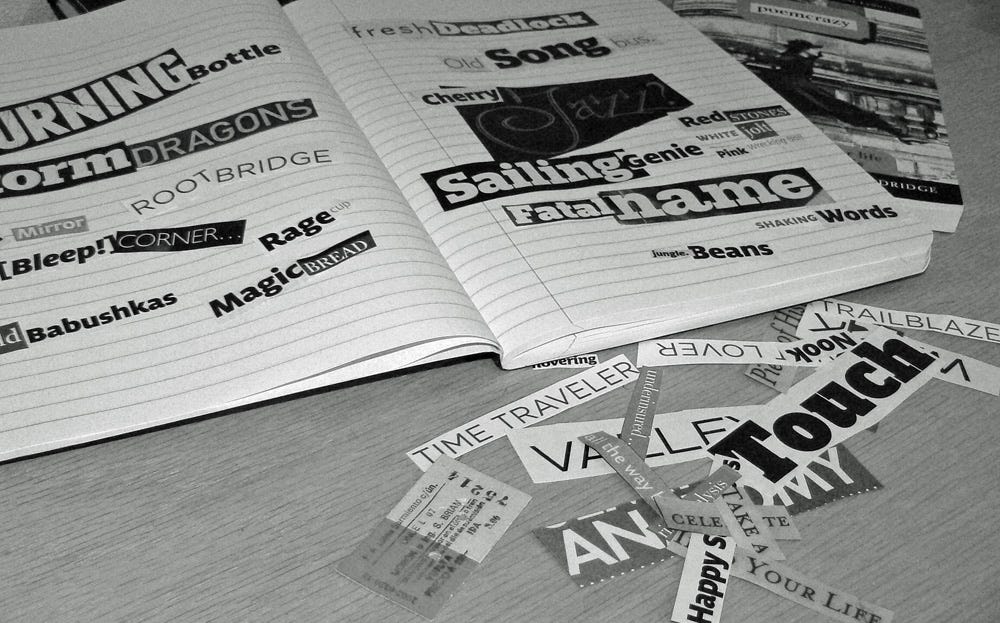We’re sharing Tweetspeak Poetry’s inspiring poemcrazy series,
a book club originally hosted by editor Will Willingham.
As a paid subscriber, you can access an exclusive video of poemcrazy’s author,
Susan Goldsmith Wooldridge, talking with Tweetspeak’s publisher L.L. Barkat.
(Includes a peek into Susan’s wildly creative office and notebooks! )
I smell smoke. Here at the wooden desk in my basement office (which is not on fire), I smell smoke. It’s a pungent mix of burned wood, paint, and electrical wires from a house fire job I worked this morning. A little like campfire plus paint thinner. But it has garlic, basil, olive oil thrown in since I filled my own kitchen with smoke roasting tomatoes for dinner. I know this because I have my shirt sleeve up to my nose, inhaling and naming the odors.
I’m looking at my hands. Even after washing dishes, the spiraled labyrinth of my fingerprints is outlined in black soot, winding from one knuckle to the next.
There is a lined sheet of paper, bent at one corner, in the case file on the desk with words scrawled haphazardly in pencil as though they were written without looking while driving down a winding gravel road: Farmers and Merchant’s Bank, grain elevator, GPS, population 97, gray snow, gray pickup, khaki Ranger cap, wide smile, Muskrat Farm Supply, farmers in overalls and feed store caps leaning on split rail outside cafe, painted black bears dancing on weathered white barn wall, laundromat (closed), notebook paper taped in window, “uptown, ” radio tower, road washed out, “Where are you? I’ll meet you in town and lead you in.”
I make these lists on my road trips. Sometimes they make their way into my writing. Sometimes I tell the stories out loud. Sometimes I just forget. But taking note of the details as I go along gives me images to work with, even if it will be another day, another story, a poem.
Susan Goldsmith Wooldridge suggests in poemcrazy: freeing your life with words that “a useful daily practice is to sit (or walk) with a notebook and focus on what’s happening right now, in minute detail.” (She doesn’t suggest doing so while driving, but I must admit that’s where I make many of my observations.)
It’s important to narrow everything down, make it as specific as you can, down to the tip of a blade of grass, or you’ll leave the reader out. For emotion to arise, writing has to be very specific—describing a particular moment or experience in a particular place. (p. 29)
This is why I write the words on the back of my file log. Why I have my nose in my shirt sleeve. Why I am studying my soot-embedded fingerprints.
Describing the details takes words—words that lend precision, depth of detail, interesting sounds, vivid images. Wooldridge writes of the word pool, collections of words borrowed from “poems, books, and conversations.” From brainstorming with groups to poring through field guides to even making up words, she’ll tell us to just collect the words.
When I’m playing with words, I don’t worry about sounding dumb or crazy. And I don’t worry about whether or not I’m writing “a poem.” Word pool. World pool, wild pool, whipoorwill, swing. Words taken out of the laborious structures (like this sentence) where we normally place them take on a spinning life of their own. (p. 12)
To play around with the words myself, I adapted one of poemcrazy’s practice exercises which involved taping words to tickets and using them as a word pool. I only had one orange and white spent train ticket from Buenos Aires to the city of Moron on hand, so I couldn’t use tickets. I just cut out words and paired them on a page of my journal in fun and interesting combinations:
root bridge
bold babushkas
burning bottle
Bleep! corner
storm dragons
cherry jazz
rage cup
sea mirror
sailing genie
shaking words
fatal name
magic bread
old song bus
jungle beans
red stones
white jolt
pink wrecking ball
fresh deadlock
Words, when we let them, let us in. This is the meaning behind her tickets. “On one side of some tickets, it even says, ‘Admit One.’ Like a poem, a ticket is small, often colorful and valuable, allowing entrance to a special place.” We invite you to spend some tickets with us—collecting words, writing poems, making your way in.
Featured photo by Nick Fewings, Creative Commons, via Unsplash.







I love poemcrazy! It is a frequent play space for me. In my poetry presentations for students and teachers, I have often had participants write nouns on slips of paper. We then gather and scramble the notes; each person picks two for a newly minted compound word. They are invited to define the word and write a poem or story with it. I have kept the lists of new words and wonderful definitions!